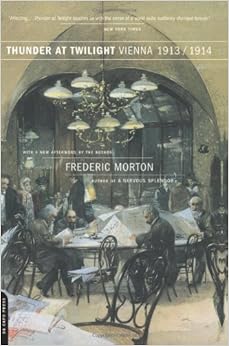Summary from Good Reads:
"Thunder at Twilight is a landmark of historical vision, drawing on hitherto untapped sources to illuminate two crucial years in the life of the extraordinary city of Vienna—and in the life of the twentieth century. It was during the carnival of 1913 that a young Stalin arrived on a mission that would launch him into the upper echelon of Russian revolutionaries, and it was here that he first collided with Trotsky. It was in Vienna that the failed artist Adolf Hitler kept daubing watercolors and spouting tirades at fellow drifters in a flophouse. Here Archduke Franz Ferdinand had a troubled audience with Emperor Franz Joseph—and soon the bullet that killed the archduke would set off the Great War that would kill ten million more. With luminous prose that has twice made him a finalist for the National Book Award, Frederic Morton evokes the opulent, elegant, incomparable sunset metropolis—Vienna on the brink of cataclysm."
Article from the BBC News: "1913: When Hitler, Trotsky, Tito, Freud and Stalin all lived in the Same Place" http://www.bbc.com/news/magazine-21859771
(http://cdnstatic-2.mydestination.com/library/images/526928_638_365.jpg)
Discussion Questions:
1. What were the factors that made Vienna at this time the center stage for many significant persons of the century?
2. What were the different groups and who were some of these people?
3. How did the rigidity of the culture and society of Europe, especially in Austria, as mirrored in the relationship of Franz Ferdinand and his wife, help make the war inevitable?
4. What made the relationship between Franz Joseph and Franz Ferdinand so difficult?
5. Discuss the relationship between Austria - Hungary and Serbia and the issues that caused tensions between these countries.
6. Was Austria unreasonable in their ultimatum to Serbia?
7. What other action could they have taken in response to the assassinations?
8. What were factors that caused the war to be so horrific, and why was this not better anticipated?
9. How and could Franz Ferdinand have made a difference in preventing the war if he had lived?
10. Why did so many people mistakenly think that his views made war more likely?
(https://c2.staticflickr.com/8/7178/6869070033_77266ee7e7_z.jpg)
(http://www.franz-josef.cz/data/image/34181/510x400/fit.jpg)




No comments:
Post a Comment